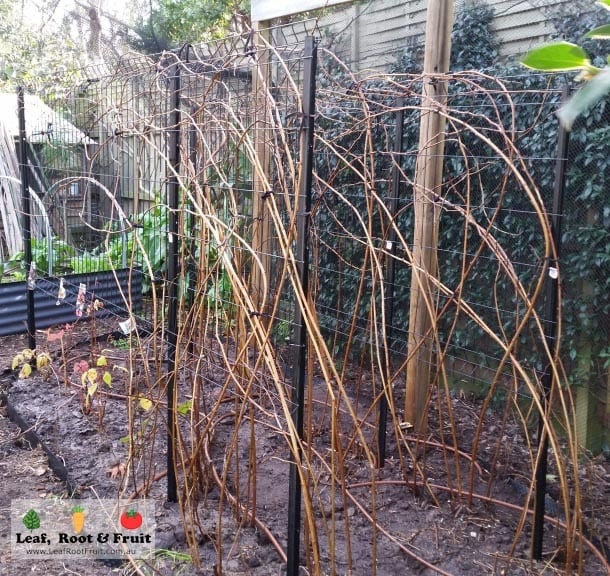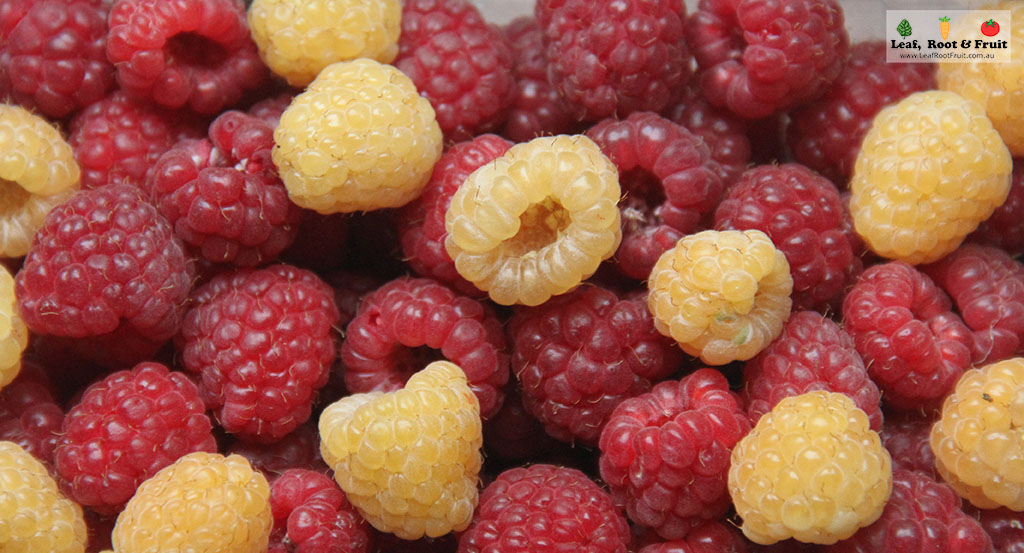Raspberries are a great addition to any edible garden. They are easy to grow and can be highly productive. Raspberries are best trained up a trellis so they can make great use of vertical spaces. For those of you worried about prickles… you can even get thorn-less varieties! Best of all, homegrown raspberries are usually packed full of flavour!

Where to plant raspberries
Raspberries evolved in the understory of European forests. This heritage enables them to grow in semi-shade, and can make great additions to Edible Forest Gardens. However, I’ve found that often when plants are grown in these conditions they produce less fruit which generally isn’t very sweet.
You need to be careful to contain raspberry plants, as just like mint, they can quickly take over a whole garden bed. You may want to consider growing them in a pot, a raised garden bed or wicking bed, to stop them escaping. I’ve seen root barriers used semi-successfully to stop their spread. Some of you may like the idea of them spreading – after all you can never have enough raspberries… right?! If they spread into lawn, they are easy enough to control by mowing the tops off.

Rats, blackbirds, possums and all sorts of other thieves love raspberries. So you’ll need to consider how you might protect your crops. Netting is a great way to keep the pests at bay, but also makes harvesting difficult (you’ll need to harvest every few days as the season peaks). If you’ve got the space and budget then consider adding a larger cage or enclosure to protect your crops.
Some varieties of raspberry canes can get quite long (e.g. Chilliwack), so consider implementing a trellis to train them along. This can be as simple as a few wires or more elaborate mesh systems.
I prefer growing raspberries through a horizontal mesh system. This makes it easy to train the canes, pick the fruit and also prune spent canes. Such systems can be as simple as some mesh held in place with star posts, or more elaborate systems involving angle iron holding up reo mesh panels cut to size.

Soil preparation and planting raspberry canes
Like most of the berry crops, Raspberries prefer an acidic soil. Work through plenty of organic matter, compost and animal manure.

Raspberries are best planted as dormant canes in winter. You can get canes from friends or family who are already growing them, from local nurseries or online. At other times of the year you can purchase plants growing in pots to plant out. For standard suburban backyards, one cane of two or three varieties should be enough to get you started. In two to three years this will quickly grow into quite a large volume of canes. Larger plantings may need larger quantities of each variety to help establish your berry patch.
Consider under-planting the raspberries with a living mulch. I have found strawberries and raspberries grow well together. The strawberries act as a living mulch to suppress weed growth and to help retain moisture in the soil. Alternatively you can mulch your raspberries with a thick layer of pine bark mulch or similar wood chip.
Raspberries are pretty easy to manage in Melbourne’s temperate climate. They are relatively heavy feeders, so applications of compost, animal manures or fertilisers are recommended in spring and summer.
I use a ‘deep litter’ system in our chook pen. I add wood chips in their pen to a depth of 15cm. The woodchips add carbon which helps to balance out the nitrogen of the chook manure. After a few months, the resulting mix is a perfect blend of carbon and nitrogen. I collect it from the chook pen and add it straight onto the raspberry patch.
Like most deciduous berries, raspberries are tolerant of heavy frost.
Primocane vs floricane varieties
Raspberries can be classified as either floricane (summer fruiting) or primocane (autumn fruiting). Primocane raspberries are traditionally pruned using a simple method. Once the canes have stopped producing (in winter) growers traditionally cut the whole lot back to ground level. The downside of such a maintenance regime is that often Primocane varieties may produce a small summer crop of fruit. Mowing all the primocane canes down in winter will prevent this small crop from being produced.
The easy maintenance of primocane varieties is offset by the fact that summer raspberries (floricane) tend to be sweeter and have more flavour (because of the summer heat, and reduced soil moisture).

Floricane (summer fruiting) varieties can be slightly more complicated to prune. To do so, in winter remove the canes that have already fruited (two-year-old wood). All of the newer canes (that have grown this year) need to be retained, as these will produce fruit in summer, when the plant wakes up from its dormancy. It’s usually easy to tell the difference between the first and second year canes.
Growing a variety of summer and autumn fruiting raspberries can ensure a good supply of fruit from around Christmas time right through to May.
My Favourite Raspberry Varieties

Some of my favourite raspberry varieties are:
Heritage Everbearer (not to be confused with ‘Heritage’) is an autumn fruiting raspberry that produces huge fruit well into May. It’s one of the best flavoured autumn varieties I have come across. Will also produce a reasonable crop in summer.
I originally included Yarra Valley Gold into our collection as a novelty. It produces medium-sized, yellow fruit in both summer and autumn. It is one of the best flavoured raspberries I have tasted and is quite a resilient plant. I have noticed that harlequin bugs prefer this variety over red ones.
Chilliwack is easily my favourite summer raspberry. The best flavour of them all and super productive. However, the canes tend to grow several metres long, so not one for small spaces.
Autumn Bliss is another great cropper that produces a very large summer crop as well as the main crop in autumn. Pretty good flavour and large berries.
Purple Raspberries such as Clyde (Rubus x neglectus) can be quite tasty, although a little tart. They are not true raspberries, instead a hybrid cross. These usually produce a huge crop of rather delicate berries. However, the cropping period for these varieties are quite short, creating a large glut.
As a general rule, I find many of the autumn raspberries, especially ‘Heritage’ (not to be confused with Heritage Everbearer) variety to have an insipid flavour. Summer raspberries tend to pack much more flavour (possibly due to reduced rainfall at that time of the year, so the sugars are not as diluted).
How to Prune Raspberries
Pruning should be done in winter (see Primocane vs Floricane Varieties for more information on how they are traditionally pruned). Raspberries don’t actually need to be pruned to produce fruit. In fact, spent canes (ones that have already fruited) will often throw out short lateral growth the following spring, and often these will produce some fruit. However, pruning in winter will reduce the congestion around the plants, making netting and harvesting easier. It will also enable better airflow, which can help reduce pests and fungal issues.
Regardless of whether they are primocane (autumn) or floricane (summer) varieties, you can apply a very simple rule to pruning raspberries. Simply inspect each cane, if it has fruited previously (you should be able to see the pedicels, or berry stalks on the tips of the cane) then follow the cane down to the base and cut it off cleanly. A cane that has already fruited will only produce a small crop at best in the next season. Taking this approach to pruning will ensure that good airflow is maintained (which helps to reduce humidity and therefore fungal issues) whilst still maximising yield of your berry crops.
Propagating raspberries
Raspberries can easily be propagated, by digging up and potting up canes. These canes are produced from underground runners. Usually, the canes are dug up in winter, when the canes are dormant. One cane planted into a pot, will quickly become many. A few canes planted into one raised garden bed will quickly fill it.
Looking to supplement your raspberries? Why not try growing strawberries or blueberries as well. They are just as easy to grow and perhaps even more productive!
Check out:
Sign up to our free monthly newsletter for plenty more hints and tips about growing your own food.


I live in Melbourne and want to grow raspberry canes in pots, can this be done? If so how many canes per pot? I have lots of 30cm pots to use.
Hi Mal,
Yes you can grow raspberries in pots quite easily. I’d use the biggest pots you can find, quality potting mix and keep watering and fertilizing them regularly.
Stay Safe & Keep Gardening!
Duncan
I live in Melbourne and along my rear fence i have about 5m where i would like to grow raspberries, blue berries and blackberries. I’m not a gardener and am learning from others, and I’m almost there and just need to get some wire and straw. I’ve bought 7 Summer canes (Chiliwack) and 3 Autumn canes (Heritage). An article on how to grow raspberries in Australia advises to plant canes in bunches of 3 about 30cm apart. Is this ok and if so does it apply to both Suumer and Autumn canes?
Hi Mal,
Raspberries are pretty easy to grow and will quickly take over a small garden space. So no need to overthink the spacing. The more canes you plant, the quicker they will establish, but in theory you only need one cane of each to get started!
Bunches of three sounds a bit excessive to me. Perhaps it was written by someone who sells canes, so they can sell even more?!
Stay Safe & Happy Gardening!
Hi I live in WA on top of a hill so the winds are very fierce. Can I grow raspberries in a shade house in raised beds.
Thank you
Deb
Hi Debbie,
without seeing the site itself it is difficult for me to offer advice. But it sounds like you are on the right track.
Good Luck & Happy Gardening!
I’ve had a couple of raspberry canes in for a year now, this will be their second winter. They neither flowered or trusted last year. I’m in the Yarra Valley. How do I prune these ans when do I feed them? New shoots have come up either side.
Keen to hear a reply to this query as it applies to me too! I bought a potted raspberry from the nursery (before doing any research) but lost the tick so have no idea what kind it is. It took off growth-wise, but no berries. It has 3 nice tall canes and new little shoots started to pop up too. The leaves have now died back and I am wondering how to prune it (just remove the dead leaves?).
Hi Carolyn and Melissa,
I only ever prune out dead canes and those that have already fruited. If your canes haven;t fruited yet and are still alive then I wouldn’t prune them at all.
Good Luck & Happy Gardening!
Duncan
My lovely neighbour planted raspberries a couple of years ago, on her side of our shared back fence.. Of course some have crept to my side of the fence. I have tended to the canes, and now I’m having some delicious raspberries!!! Bonus!! Thank you neighbour!!
If the raspberries have been neglected for a year how do you distinguish three year old canes that are just budding for removal?
Hi Ivan, the most basic rule is prune any canes that have already fruited. Look for the old pedicels (fruit stems) then follow the cane back to ground level and remove.
Good Luck & Happy Gardening!
Hi Duncan
Thanks for your info, I find it really helpful as a novice gardener just out of Kyneton.
My raspberries are fruiting and they are juicy and delicious but the fruit are really small. Any ideas?
Thanks, Eliza
Hi Eliza,
Small raspberries could be caused by a few things:
– Variety selection, some varieties tend to produce small berries
– Poor pollination, this will be apparent of the fruit only has a few druplets, rather than a large cluster
– Irregular watering, which I think will be the most likely cause. Last year I found out the hard way that raspberries are very sensitive to sudden drying out of soil moisture. You’ll need to up the watering in future years. I’ve been watering mine since the end of October.
Good luck and happy gardening
Duncan
Hi Duncan,
Could you please recommend the best varieties to grow in pots in Melbourne, and also what sized pots to grow them in please. I’d like to try growing them this year.
Hi Marie-Claire,
Some of the varieties with shorter canes would be best (avoid Chilliwack!). Heritage Everbearer and Autumn Bliss are good choices.
good luck and happy gardening
Duncan